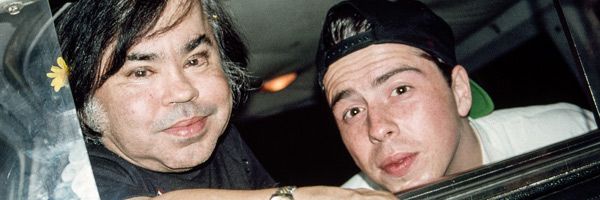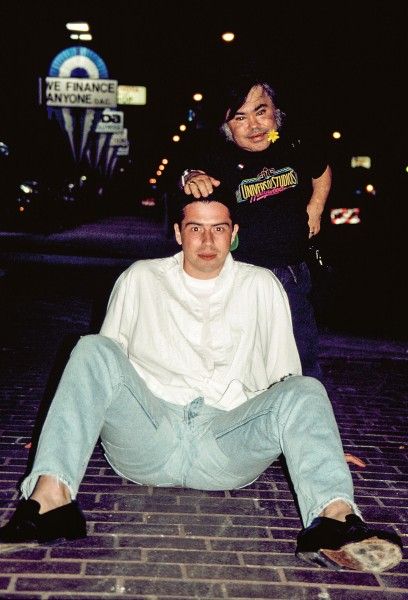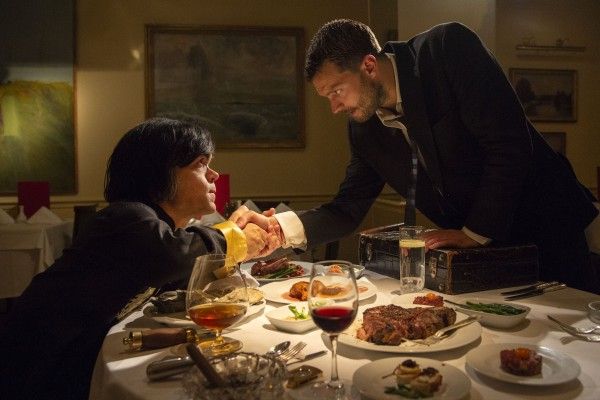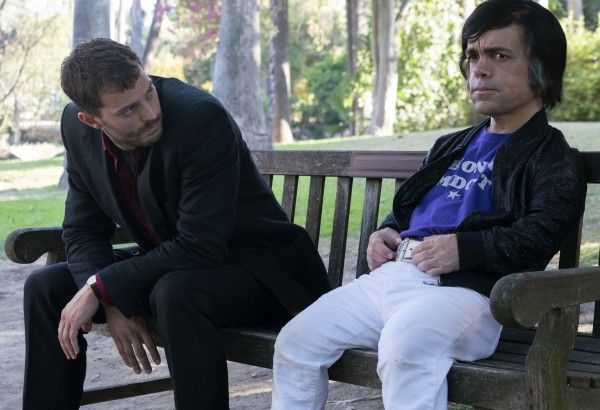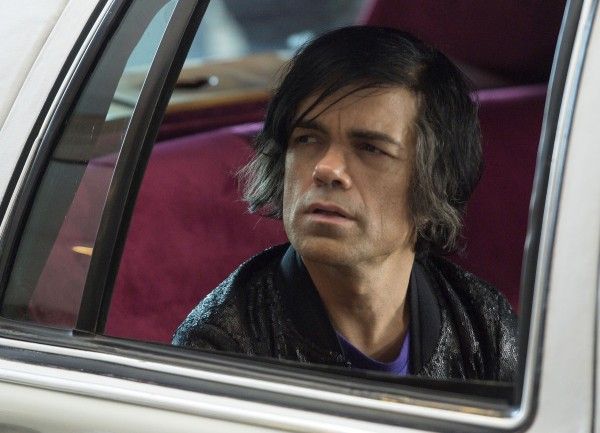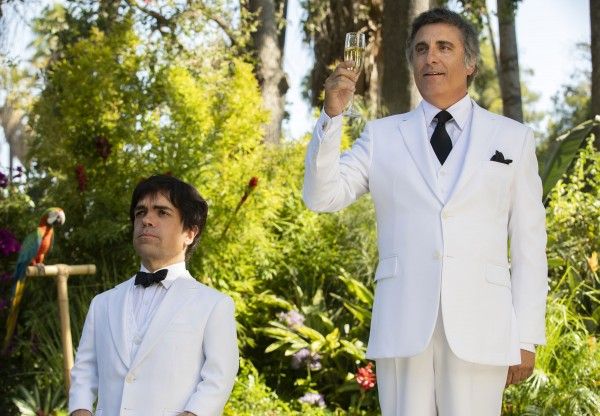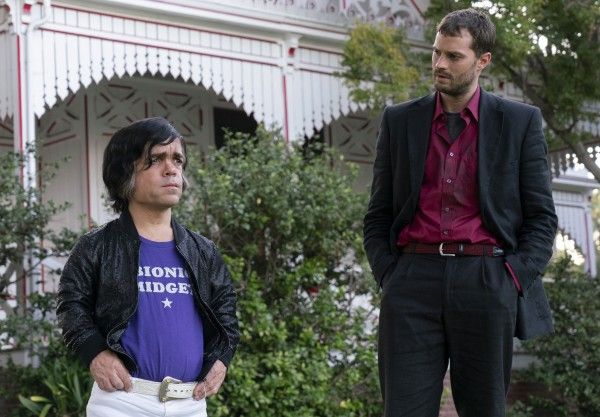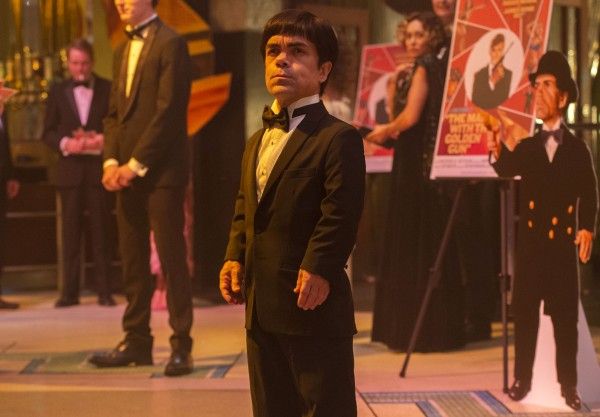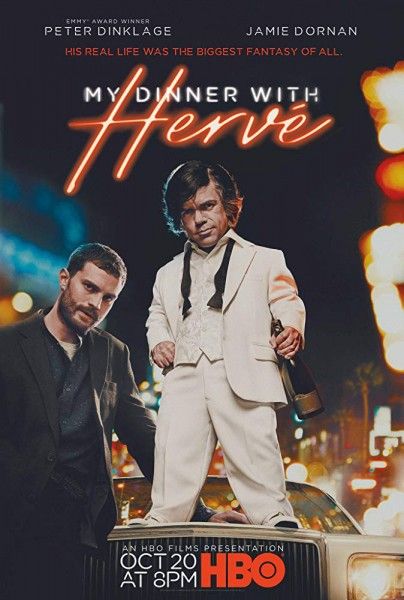From writer/director Sacha Gervasi (Anvil: The Story of Anvil, Hitchcock) and inspired by his own experiences, My Dinner with Hervé tells the story of what happened when struggling journalist Danny Tate (Jamie Dornan) reluctantly took an assignment to interview actor Hervé Villechaize (Peter Dinklage) that turned into so much more. After having the French dwarf pull a knife on him and being challenged to delve deeper into the man behind the public persona, an unlikely friendship formed over a wild night in Los Angeles that became a life-changing experience.
During this 1-on-1 phone interview with Collider, filmmaker Sacha Gervasi talked about how much stranger the truth can be than fiction, the runner-up for stand-out experience during his time as a reporter, the affect his wild experience with Hervé Villechaize had on him, developing the project with Peter Dinklage, why they never gave up on making this film, finally finding the perfect home at HBO, how he came to cast Jamie Dornan, teaching audiences about Hervé the man vs. the persona, the overwhelming reaction he received from Hervé’s girlfriend, and what he’d like to do next.
Collider: This film is so interesting because it’s one of those stories that has to be true, since there’s no way that you could make up something like this.
SACHA GERVASI: Exactly! You could never make it up. As we all know, life is so much stranger than anything you could in fiction. It’s such a crazy, unexpected story, and I think the film reflects the unexpectedness and the surprise that I also felt, being thrust into this epic experience. It was wild.
When you were sent on this assignment by your paper, to do this interview back then, could you ever have possibly imagined that you’d be here now, all of these years later, talking about this movie?
GERVASI: How could I possibly answer yes? When it was being decided that, for a part of this particular L.A. trip, Hervé was going to be a part of it, it was the jokey cherry on top of the icing on top of the sundae. If you told me then, as we were laughing about it, that the encounter I would have with Hervé would profoundly change my life, and that 25 years later, I’d be talking to you about a movie I made about that encounter, I never, in a million years, would have believed you. It’s so odd and wonderful.
Hervé was such an odd and mysterious figure that this wild and crazy story seems like the perfect way to represent him.
GERVASI: Exactly! Obviously, it started off as a jokey where-are-they-now piece. A lot of the scenes in the newspaper office, the restaurant scene, and certainly the scene in the Universal Sheraton at the end, were just so what happened. At the end of our first meeting, he pulled a knife on me. I’d done a 30 minute interview and he said to me, “I’ve told you all the bullshit stories. Now do you want to hear the real story of my life?” At that point, he was standing two feet from me, holding a knife at my throat. When you’re on the cusp of being stabbed to death by the dwarf from Fantasy Island, it’s pretty crazy.
I would imagine that it makes you re-evaluate your life choices.
GERVASI: It really does! What Peter says at the table is what Hervé said to me. He said, “You already wrote the story before you got here.” And to be fair, that was true. He was really just trying to get my attention to say, “You’re like everyone else. You judged me for this stupid line on a very famous show, but you really have no clue as to the real truth about what it’s like to be me, and to have lived my life with the things that I’ve been through.” Just as a human being, let alone as a journalist, I was intrigued, immediately, to try to understand him. I thought I knew what the story was, but really the story was completely different from what I had imagined. It was one of those 180 situations in life, where suddenly everything turns on its head.
Would you say that that was your most memorable experience, as a reporter?
GERVASI: I would say that a distant second was the time that I met Johnny Rotten, of the Sex Pistols, in a SoHo restaurant to interview him for his book, No Irish, No Blacks, No Dogs, and he threw a chair across the room when he discovered that I had been to a public school. He decided that I was not worthy of interviewing him, so I nearly had a fight with Johnny Rotten. That’s a distance second. Nearly being shived to death by Tattoo is definitely the gold medal, let’s be honest. What was notable about the fight with Johnny Rotten was that, as soon as he threw the chair and he was screaming at his publicist, after he got it out of his system, then he sat down and was like a nice middle-class boy. He was like, “Okay, let’s get on with talking about the book now.” He was offended by multiple things, like the fact that I was actually working for the same magazine for which I interviewed Hervé. It was pretty funny. When Johnny Rotten smashing a chair across the room is a distant second, you know that Hervé was something.
You developed this with Peter Dinklage for a number of years. What were the most memorable conversations that you guys had about making this?
GERVASI: I think it was really interesting to watch Peter’s own journey. He initially really thought much the same way as I did, which is what he didn’t really know much about Hervé, but he felt that he had demeaned himself, a little bit, by doing these geeky type of things. But as he got into the story, he understood the layers and got a bit more of the family dynamic. It was a constant evolution. In a strange way, he took the journey that Tate takes in the movie. He went from judgment and skepticism to empathy and connection. It’s largely true of any story, within reason, that when you peel away the layers of who you think someone is and you get to the more balanced truth of who they actually are, often the commonalities are so much more similar that it can frighten people. It frightened me to think that I had so much in common with Hervé. It was scary.
We still have this attitude, this scapegoating thing, where we want to create distance from people who are different from us or who we view at “freaks.” Because we live in a world with such decisiveness and judgment, I wanted to make this film now. It’s exploring the hollowness and vacuousness of fame and how it distorts the psyche, but it’s also about how dangerous rushing to judgment can be and how it separates you from people. It isolates you. Sometimes it’s worth taking the time to peel away the layers and discover who people really are. I learned that I had more in common with a 3'10" Frenchman wielding a knife than most of the people who worked in my office, who I detested and despised, which you get a bit of in the film.
There was a really toxic culture in British newspapers, at that time. The ‘80s and ‘90s was the worst. A lot of the culture was about bitterness and envy. People would take pot shots because it was so much easier to sit on the sidelines, judging. It was particularly bad in England, at that time, and I just couldn’t do it. It was not that they killed the Hervé story, but they watered it down. They took out all the stuff that was personal. In a strange way, I should say thank you because, as a result, there’s this film. Had they done it as we wanted, which was a cover story with 12 pages, I may not have felt the need to tell the story and tp honor the promise that I made to Hervé. Maybe I would have felt that I’d told the story. Instead, the first script that I ever wrote was a 34-page script, called My Dinner with Hervé. It was my attempt to honor, much more closely, the truth of our encounter, which was much more personal.
You started collaborating with Peter Dinklage on this, and then he went and got cast in one of the biggest TV shows of all times, with Games of Thrones, which happens to air on HBO, who then eventually became the home for this movie.
GERVASI: It’s so weird. I remember me and Peter going round with our tin pot, begging to make this movies. I can’t remember whether it was a studio head or a senior exec who said to us, “Guys, listen, you’ve come up with the single most uncommercial concept in the history of film – a suicidal dwarf picture that takes place over five decades. It’s Citizen Kane about Tattoo. We love you Peter, you’re a great actor, but no one is ever gonna make this.” At that point, he was an indie darling with The Station Agent, but it was pre-Game of Thrones. We were obviously disheartened, but for some reason, we just never gave up. Peter is the kind of person where, the more you tell him that he can’t do something, the more determined he is to show them that they’re wrong, and I have the same personality. We really supported each other and buoyed each other up, through the endless refusals and turn downs and rejections that this film experienced.
When you look at it now, you can see the connection between Hervé and Peter. It’s the most famous dwarf in the world on the biggest TV show in the world then, being played by the most famous dwarf in the world on the biggest TV show in the world now. You could never make that up. It’s almost like God is poking a finger into this dimension saying, “Guys, hello, I’m here.” We did have offers to make the movie, over the years. The movie didn’t get made for so long, not because we couldn’t have gotten it made. We could have, certainly after Game of Thrones hit. But Peter and I decided that either we were going to make this right. We wanted to make an epic story about Hervé and about Tattoo, or we were not going to do it, at all. We just refused to compromise. Obviously, Game of Thrones became such an international hit and worldwide phenomenon that, when HBO called up, we were able to say, “Look, we really want to do this one way, and that’s to do it properly.” And to their credit, they said, “We love the script. We think it’s completely unlike anything, and it’s different for Peter. We’re all in with you guys. Do what you need to do. We’ll support you.”
What was the thought process that went into deciding to cast Jamie Dornan to essentially play yourself?
GERVASI: Well, Jamie Dornan plays a character called Danny Tate. It’s a basic fact that Danny Tate is inspired by my actual story, but the reason he’s called Danny Tate is because he is a different person from me. He’s a fictionalized character, and there are several reasons for that. Mainstream America perceives Jamie Dornan in a certain way. In England, we know him for The Fall and The Siege of Jadotville, and all of these other cool things that he’s done, while mainstream America obviously knows him for Fifty Shades. So, in a strange way, the film is about judgments and about how we all rush to judgment, and I think that casting Jamie in the role played into that theme. That you think it’s one thing, but as you see Jamie’s performance, it’s so drastically different, more powerful, more real, more imaginative and original than anything you might have thought, and that was part of it. The other part of it was that he really wanted the part. He doesn’t audition. He gets offers to star in movies, all the time. Jamie played as much a version of himself, as he is me. He did it in his actual Irish accent. He absolutely owns the part because Danny Tate is as much Jamie as it is me. When he came in, he fought for the part and said, “I really am feeling this. My intuition tells me that I can do something special.” And when an actor is hungry to do something, you want the people that are hungry and passionate. His audition was also just so bloody good. I remember filming his audition with my iPhone and going, “I wish the crew was here. Will I ever get this performance again?” He was just so wonderful and powerful, and there’s also this warmth and affection. It was such an interesting and different and textured performance that he gave. I knew he was the right guy. I knew people would expect him to be a version of Christian Grey, and I knew that he would really knock it out of the park and really change perceptions about himself, in a way that the movie changes perceptions about Hervé.
What do you hope this film helps people to understand about Hervé the man vs. the persona?
GERVASI: Part of it is about how success and fame distorts the psyche. We’re living in a time that is so fame obsessed. People used to ask kids, “What do you want to be when you grow up?,” and they would say, “I wanna be an astronaut, or a doctor.” Kids these days say, “I want to be famous.” And you see kids growing up looking at Instagram, comparing their insides to other people’s outsides, and always coming up short. They feel like failures. Their whole self-worth is hinged on how many likes they get. It’s tragic. If your happiness is entirely dependent on things outside of your control and other people’s approval, it sucks. To me, it’s timely to do something about fame. It’s also about judgment. The journey that Danny Tate goes through in the film was my journey. I went from judgment and skepticism, at best, to empathy and connection. It’s about how sometimes you really do need to drill down and peel away the layers to get to a more complete sense of what people are like. It’s about how we all rush to judge, and how dangerous that can be.
I want people to watch it and be entertained because it’s a wild ride and it’s fun. I know Jamie, Peter and I would be thrilled, just with that because the point of the movie is to engage people and for them to have an entertaining experience. On an equal level, if people connect with it, we’ve had people have very human reactions where they’ve said, “It really made me think about my own life.” That’s what you want. It’s about two characters who are not fully taking ownership of their roles in things. Tate is not taking responsibility for the fact that he’s actually an alcoholic and his alcoholism has destroyed his family, and Hervé is not looking at his own role in destroying the greatest opportunity of his life. It’s about taking responsibility, the stories we tell ourselves, and how we delude ourselves because sometimes it’s too painful to see how much at fault we have been and how responsible we need to be. It’s so much easier to blame other people, and to blame our parents or the boss at the office. To really take stock and be honest about your role in that is an important thing.
After you spent so many years thinking about making this, it finally getting made, and being on the verge of getting it out there for people to see, where do you go next?
GERVASI: I don’t know. It’s been one of those crosses that Peter and I have had to bear for so many years that I don’t quite know what I’m going to do next, but I know that it’s going to be good. I met a total stranger in the final week of his life, and he opened his heart and spilled his guts to me. I had no idea what was going on, and he left me as someone who he entrusted this story with, which no one had told, and 25 years later, I’m finally able to communicate that to the world, in the best possible way with the best possible actor and with the greatest possible support. People are having very emotional reactions to the film, which is so satisfying because I feel I dispatched my karmic duty to this guy who, by the end of our week together, really became my friend. I feel good about that. I feel lucky. Kathy, his girlfriend, who’s played in the movie by Mireille Enos, came up to me after the premiere and said, “Thank you, Sacha, for speaking for Hervé. Because of you and your insight in seeing Hervé as the man he really was, I know he trusted you 100%, which was rare for him. He felt love for you. This is a great gift that you’ve given me, seeing Hervé’s name everywhere, and the way that Peter has brought him to life and brought him back to me. You’re amazing! I will love you for the rest of my life.” That was amazing!
Kathy was in a relationship with Hervé for 14 years, and she lived with him for the last four years. She was there in the house when he killed himself. She called the ambulance. She obviously knew him much more in-depth than I did, but I got the sense of who he was. He was an incredibly well-educated, talented and brilliant artist. He was the youngest painter ever to have his work displayed in the Museum of Paris. He was just an unbelievably original character, not just physically, but in every way. He was urbane, cosmopolitan, hilarious, dangerous and crazy. You just don’t get people like that. We’ve got to stop with the stereotypes and the punchlines because people are much more than that. We’re all wonderfully fucked up and interesting, in our own way. We’re all conflicted and contradictory sometimes. Human beings have many, many different dimensions, and it’s just so important for us to recognize that and that we’re all doing the best that we can. The commonalities really are always so much deeper. The differences are superficial quite a lot of times. Because things are so divisive right now, and we live in the era of us and them, it’s all about pointing the finger in judgment, and that’s all bullshit.
Do you have any idea what’s next for you?
GERVASI: Anvil and My Dinner with Hervé are two very special films. They’re my most personal films, and both of them end with a photo of me and the actual subject. There is a third film, where I have a photo with me and someone, and I won’t say who it is, but it’s about love and life and death. It’s pretty intense. So, I’m working on that. You spend years making a film, and you hope that it reaches people, and in this case, it feels like a lot of people are feeding back to us that they’ve had an experience they weren’t expecting and it’s made them think. You can’t ask for more than that.
My Dinner with Hervé airs on HBO on October 20th.

